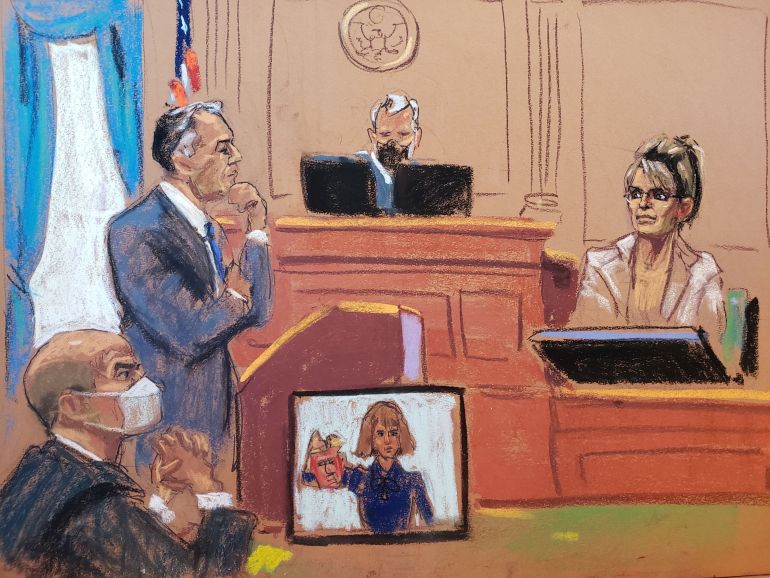Sarah Palin versus the New York Times court battle nears end
Jurors must decide if Palin proved the newspaper knew the editorial was false or had reckless disregard for the truth.

A defamation case by Sarah Palin, a former Alaska governor, against the New York Times is heading to a jury, after her lawyer accused the newspaper of falsely associating her with a mass murder in a 2017 editorial – a link the newspaper said was an honest mistake.
In closing remarks in a federal court in New York City on Friday Palin’s lawyer Kenneth Turkel said the Times and its former editorial page editor, James Bennet, turned a “blind eye” to the facts as it smeared the reputation of Palin, a former Alaska governor and 2008 Republican US vice presidential candidate.
Keep reading
list of 3 itemsAlaska releases Sarah Palin’s official emails
Speculation over Palin bid
“The Times resurrected a horrific, false accusation [that] in its simplest form accused Governor Palin of inciting the murder of six people,” he said. “She’s got thick skin. This one crossed the line.”

In response, Times lawyer David Axelrod said the editorial was not meant as a “political hit piece” and that Palin offered no evidence it harmed her reputation, citing her continued public appearances after it was published.
“It’s about an honest mistake,” Axelrod said.
The editorial came out nearly a decade after Palin’s fleeting fame as the Republican vice-presidential nominee to John McCain in the 2008 presidential elections. That year, Barack Obama, a Democrat became president, and the current US President Joe Biden, was his running mate.
Turkel told the jury that Palin, 58, had been trying to lead a quiet life when the newspaper piece came out and drew her into an unfair fight.
“What this dispute is about in its simplest form is power, and lack of power,” he said. He also called it an example of how The Times “treated people on the right they don’t agree with … They don’t care. She’s just one of ‘them’.”
The lawsuit concerns America’s Lethal Politics, a June 14, 2017, editorial addressing gun control and lamenting the deterioration of political discourse.
It incorrectly linked Palin to the January 2011 shooting in a Tucson, Arizona, parking lot where six people were killed and then-Democratic US Representative Gabby Giffords was seriously wounded.

The Times ran a correction but never apologised to Palin, which was “indicative of an arrogance and sense of power that’s uncontrolled”, her lawyer said.
In her own testimony, Palin spoke about being a mother and grandmother still living in her Wasilla, Alaska, hometown, likening herself to the biblical underdog David against the Times’ Goliath.
She said the editorial left her feeling “powerless” and “mortified,” upset her sleep, and caused people to think less of her.
But while Palin’s public profile has long been lower than in 2008, she failed to offer specific examples of how the editorial hurt her reputation or caused her harm.
Bennet testified during the trial that he never intended to blame Palin or her political action committee.
Jury deliberations could begin later on Friday. Jurors must decide whether Palin proved with clear and convincing evidence that the Times and Bennet acted with “actual malice,” meaning they knew the editorial was false or had reckless disregard for the truth.
Palin is seeking unspecified damages. She cannot obtain punitive damages.